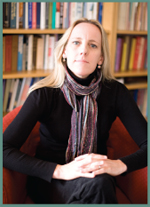I can tell you this: AHA conferences are fun.

IT WAS NO SMALL TASK for Lawrence Krauss to make it to the Grand Hyatt in Denver on May 9 to accept the 2015 Humanist of the Year Award. When he arrived at the pre-banquet cocktail reception he told me he’d been up for forty hours straight, having traveled on four different airplanes from a film shoot 4,000 meters up in the Andes (in Bolivia, I believe). I think he even said that when he got to one airport in the wee hours it was shuttered, and the only sign of life was a dog sleeping up against the front door. Professor Krauss, foremost a theoretical physicist but also a public intellectual and firebrand for science education and humanism, was a lot of fun to talk to. He was also clearly moved by the award and exceedingly generous; forty-plus hours awake and he still he took numerous questions after his speech, posed gamely for photos, and signed books until he was surely ready to drop.
This year was my ninth American Humanist Association conference—the 74th annual—and I can tell you this: AHA conferences are fun. Part professional meeting, part retreat, part family reunion, I almost wonder if it’s like a year’s worth of church services wrapped into four days. Except that the theology has been replaced with high-potency humanism. AHA annual conferences don’t have stated themes, but rather strive to offer a variety of philosophical, scientific, political, and personal talks and training sessions relating to humanism. However, one thread I noticed this year, also examined in the July/August issue on humanism and race, had to do with the importance of cultivating doubt and embracing uncertainty in order to better understand each other and the world around us.
Lawrence Krauss spoke of the vital necessity of maintaining our ability to doubt in the quest for knowledge and for educating future generations of critical thinkers. Church/state scholar and litigator Marci Hamilton (Religious Liberty Award) delivered a forceful and impassioned speech on the threats to religious liberty posed by the Religious Freedom Restoration Act (RFRA) and its state counterparts. Media critic and filmmaker Jean Kilbourne (Humanist Heroine) illustrated the shocking objectification of women and the sexualization of very young girls in advertising, highlighting some empowering counter-ads that brought many in the audience to tears. And NASA evolutionary biologist-astrobiologist Lynn Rothschild (Isaac Asimov Science Award) gave an inspiring and often humorous talk on her study of the origin, evolution, distribution, and future of life—both here and in outer space.
The impressive list of 2015 award recipients also included nineteen-year-old Isaiah Smith (Humanist Pioneer), who, as a high school student in Texas, challenged a number of Establishment Clause violations at his school. He even held up the very Bible from which he’d ripped sections of Leviticus in class in reaction to classmates who were bullying him.
From the National Day of Reason reception Thursday evening to Kelly Carlin’s poignant Sunday keynote ad-dress, this year’s AHA conference provided a lot of laughs too. Accepting the Humanist Media Award on behalf of The Onion, Senior Editor Seena Vali adopted a blowhard persona, declaring his satirical publication the pinnacle of journalistic excellence as he went through one outrageous headline after another. Conference goers expecting good humor were not disappointed, nor will you be after reading his adapted speech herein.
As the 2015 AHA conference was wrapping up, the Pew Research Center released new survey data showing that the number of American nones (those who identify as atheists, agnostics, or as having no particular religious affiliation) continues to rise. As more people leave religion, and as secular millennials age and seek out ethical frameworks, humanism must be poised to offer more opportunities to encounter the kind of fun, enriching, challenging, and supportive community one finds at an AHA conference.
